In the late 1950s and early 1960s, British culture experienced a movement that started depicting social realism in its films, theater, and novels. This new style of art centered on the plight of the working class, a group of people who had previously mainly been used as comic relief in the high-end British dramas of previous eras. Known as ‘kitchen sink realism’, this genre focused on the harsh realities of everyday life in England. Social issues such as poverty, teen pregnancy, interracial romance, and homosexuality were portrayed with aplomb. The general public finally saw their lives accurately depicted onscreen in films such as 1959’s Room at the Top, 1960’s Saturday Night and Sunday Morning (starring celebrated stage and screen actor Albert Finney), and plays such as author Shelagh Delaney’s 1958 play A Taste of Honey.
In 1961, Shelagh adapted her play into a film that became one of the quintessential examples of the kitchen sink drama. And boy, this movie’s got it all! Its plot reads like a laundry list of heretofore taboo subjects in British culture. Is this really how the working class Briton lived their lives? A Taste of Honey is a favorite film of the singer-songwriter Morrissey (famous for being the lead singer of 80s band The Smiths and for his subsequent prolific career as a solo artist). Morrissey went so far as to ‘borrow’ lines from the movie and use them in some of his early song lyrics. I’ve been a huge Smiths/Morrissey fan for the past 25 years and I’d never gotten around to seeing the film that influenced his art so much, so I figured that a viewing was long overdue. So join me in the double decker bus as we travel back to Northern England, circa 1961, and look into this classic movie!
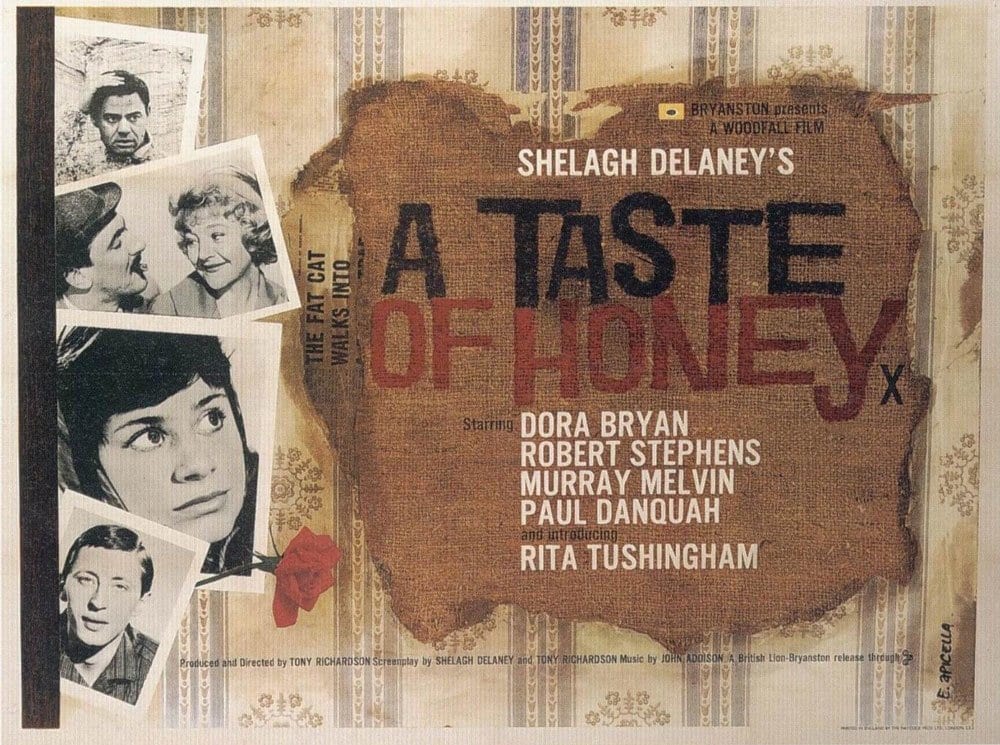
A Taste of Honey tells the story of 17-year-old Jo (played by Rita Tushingham), a schoolgirl on the cusp of graduating high school. Jo is plucky and poor, living with her mother in a cheap apartment (or ‘flat’, if we are really going full steam ahead with British terminology). They live in Salford in Northern England, which is a part of the Greater Manchester area. Jo’s ambitions are the same as most poverty-stricken students of the time upon graduation—find a blue collar job with decent pay and move out on her own. I feel for this girl. She and Mum are always getting behind on rent and moving around town like gypsies. At the start of the film, they even skip out on their debt to the landlord by sneaking out of a window with whatever possessions they can fit into a few bags. They move into a new place just across town which is basically just a studio apartment and poor Jo actually has to sleep in the same bed as her mother! Kids today get upset if their WiFi is too slow. They don’t know what real hardship is until they have to share a blanket with dear old mom every night. Mum likes to go out at night and live it up, carousing with men in the local pubs, leaving Jo on her own to sulk and walk around town, looking gloomy. During one of her bored excursions around the Manchester Ship Canal, Jo has a meet cute with Jimmy, a black sailor. Jo and Jimmy frolic and fall in whatever kind of love it is that can happen in like two weeks. They have sex before he sails away, never to be seen again (I’m sure you can tell where this is all headed, but more on that in a minute).
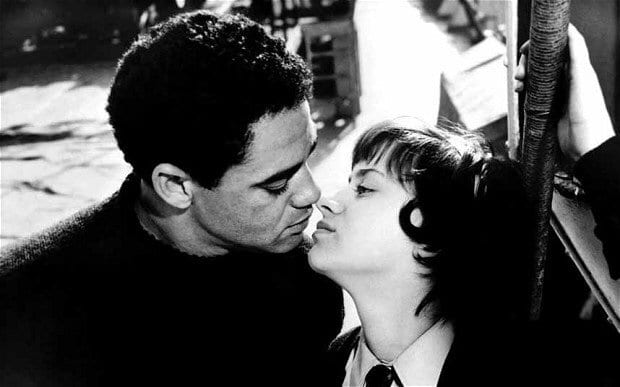
Meanwhile, Mom gets married to a younger guy named Peter. Jo’s dislike of her mom’s new husband prompts her to get a job at a shoe store and move out on her own, to an equally dumpy apartment. She meets homosexual Geoffrey at the shoe store and starts hanging out with him, leading to Geoffrey becoming her roommate. Then the real melodrama ramps up when (surprise!) Jo finds out she’s pregnant with the sailor’s baby. She and Geoffrey spend the rest of the movie trying to prepare for the baby in their unconventional living situation. Also, Peter turns out to be a jerk and divorces Mom. So now Mom is in the picture again, trying to push her way back into her daughter’s life while criticizing her lack of judgement at the same time. Does this sound like an ancillary plot on The Young & The Restless to you? Yep, this movie is soapy as hell.
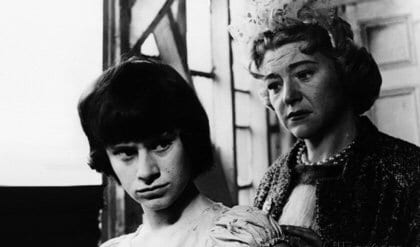
I’m not sure if this film reaches ‘classic’ status for anything other than its social implications at the time. It’s well-acted and the script is full of quotable lines that come off as morbidly funny observations on life. The cinematography is efficient enough to give the viewer a sense of what it must have been like to be living in Manchester during this era. But is this a story with any importance in the grand scheme of things? It plays almost like the extended pilot episode of a new weekly soap opera. For all of the ‘scandalous’ shenanigans, the story moves along at a snail’s pace. Jo doesn’t find out about she is pregnant until two thirds of the way through the film. Until then, we are just following her around, watching her live a largely ordinary (yet amusingly sardonic) life. After the pregnancy bombshell, I kept waiting for an explosive ending to hammer home some sort of message. Instead, the film ends on a quiet, bittersweet moment that is effective yet seems tailor-made to set up a sequel that never came.
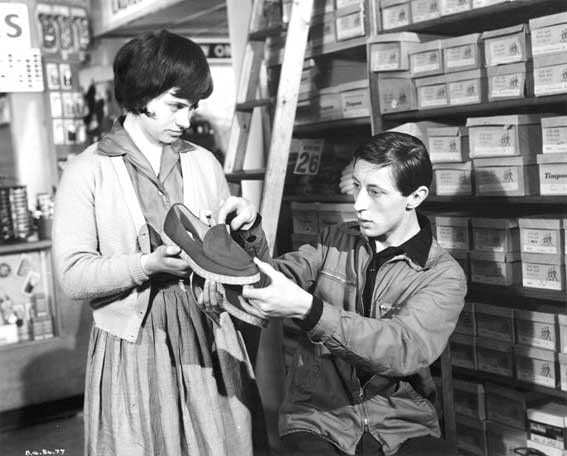
The real meat of any kitchen-sink drama is the shocking social issues contained therein. Here’s the Taste of Honey Scandal Checklist:
- Poverty. Jo and her mother are dirt poor. I’m not even sure what Mum does for a living besides leech off men in bars. There are lots of scenes set in dirty apartments in the bad part of town. Jo seems to have little ambition beyond working in the shoe store. There’s a quiet desperation from the characters that permeates the movie. I’m sure that in 1961, this was a welcome break from British films about rich people having attacks of moral conscience in the presence of their butlers.
- Interracial Romance. Jimmy the sailor is black and Jo is white. In 1961, this sort of romance was very uncommon onscreen. Hollywood didn’t have its first interracial kiss until 1957’s Island in the Sun, just one year before Taste Of Honey debuted in a small theater in London. The Jo/Jimmy love story doesn’t focus on the racial angle until the very end of the film, when Jo’s mother finds out her daughter is going to have a black baby and flips her wig. Everyone else is just like “oh yeah, you’re seeing a black dude, no worries”. I believe that this sort of matter-of-fact portrayal of interracial love was very brave and way ahead of its time. It’s refreshing to see a movie from this era that features a black man and a white woman falling for each other where race isn’t the driving factor behind the story.
- Unwed, Teenage Pregnancy. How common was this back in the late 50s/early 60s? I’m pretty sure that you were a social pariah if you got pregnant before marriage back in those days. While watching this film, I had to keep reminding myself that this was a hot-button issue at the time. Nowadays everyone has babies out of wedlock.
- Homosexuality. Geoffrey doesn’t come right out and say “I’m gay!” and for good reason—homosexuality was illegal in the UK until 1967. He intimates that he got kicked out of his apartment when his landlady caught him with another man. He makes a sad attempt at romancing Jo, telling her he’s never kissed a girl before (back then, if you were gay, you weren’t opposed to trying to make it with the opposite sex just to fit in with society). All of the characters in the film, especially Mum’s new husband Peter, assume that Geoffrey is gay just by looking at him. He’s a skinny, nerdy white dude but he’s not particularly effeminate (especially when compared to anyone on RuPaul’s Drag Race). I’m not sure why everyone is so immediately certain of his gayness. I guess if you weren’t super-macho back then, it meant you were gay?
- Abortion. This subject is merely glazed over in the film. Geoffrey suggests to Jo that she could terminate her pregnancy, and she responds with disgust at the idea. Abortion was illegal in the UK until 1967 as well.

From the Taste of Honey Scandal Checklist of 1961, only abortion is still a hot-button issue today. Poor people, interracial couples, unwed mothers, and gays are depicted in media all the time. I feel that to really appreciate this film, you have to set your mind’s dial back to the sensibilities of life in 1961. This movie was probably whispered about in dark hallways back then, its transgressions being a major part of its appeal. In 2019, the film plays as a light melodrama, not nearly edgy enough to compete with the stories being told on Shameless. That being said, the film does have its charm. The dialogue by director Tony Richardson and Shelagh Delaney is very well-written, full of wry observations on life, some of them very dry and humorous. I’m curious to see what the original stage production was like because from what I’ve read, it was much more harsh than the toned-down movie version (in the original play, Mum was a hardcore alcoholic and some of the characters had a much more negative response to the interracial romance).
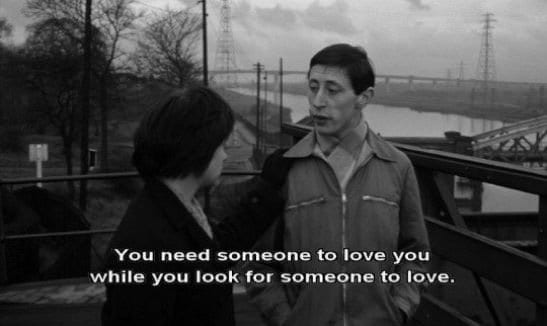
Other things I thought about while watching this movie
- It’s obvious that Shelagh Delaney has a knack for dialogue. There are quite a few sterling lines in this film:
“We don’t ask for life. We have it thrust upon us.”
“You need somebody to love you while you look for somebody to love.”
“You don’t look 40. You look a sort of well-preserved 60.”
Mum’s dialogue in particular harkens back to a certain type of world-weary middle aged woman of England. The type of woman I’ve never met but surely must have existed. - If you like knock-down, drag-out family fights, there are a couple of them here you will really enjoy. One takes place at a carnival in Blackpool and there’s another one later on near the end in Jo’s apartment. Both of them heavily involve Peter, Jo’s new stepfather. Peter is crass and self-involved, but his character is never portrayed as one dimensionally evil. This film is refreshing in that there aren’t really ‘good guys’ or ‘bad guys’, and even protagonist Jo comes off as petulant sometimes.
- Speaking of that carnival in Blackpool, what the hell was going on in that sideshow? Scantily clad women on top of each other, another woman showing her nipple? There were families watching this happen in a tent! Was this a real thing that happened in the 60s?
- Being a big Morrissey fan, it wasn’t difficult to pick out the lines from the film that he used in his song lyrics (“I dreamt about you last night, fell out of bed twice!” says Jimmy to Jo early in the movie). Morrissey, having spent his youth in Manchester, surely related to this film because it takes place virtually in his backyard. The air of hopefulness and the sly wit surrounded by bleak despair could have been a backdrop for a video of almost any Smiths’ song.
- The ending of the film has Mum coercing Geoffrey to move out of Jo’s apartment (without Jo’s knowledge). Jo walks out into the street looking for him but he evades her and runs off into the night, leaving her standing near a bonfire with a bunch of children (I guess it was perfectly okay to let your kids dance around a fire in the street in 1960s England). Jo lights a sparkler with a warm, emboldened gleam in her eye. It was a quiet, reserved ending for such an emotional movie. But my minor disappointment at the bittersweet ending changed after my second viewing of the film. I realized that in a way, this was an accurate depiction of how life is—often people in your life just fade away and you’re left without answers. Someone who is so important to you one day can just vanish and you’re left picking the pieces up and moving on the best you can, because you must.
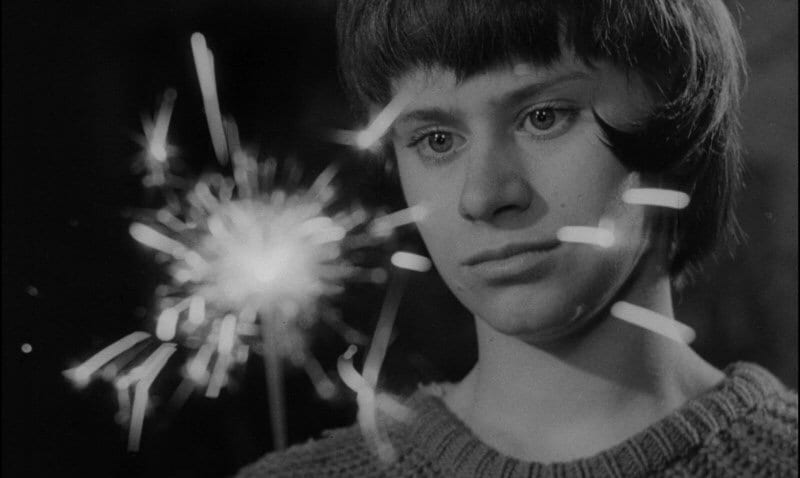 A Taste of Honey is available on DVD and is currently streaming on the Criterion Channel.
A Taste of Honey is available on DVD and is currently streaming on the Criterion Channel.



